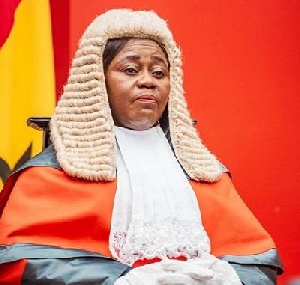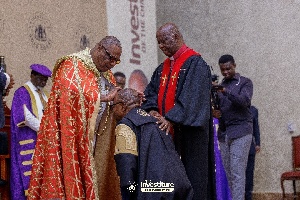- General News
- Crime & Punishment
- Politics
- Regional
- Editorial
- Health
- Ghanaians Abroad
- Tabloid
- Africa News
- Religion
Politics of Wednesday, 21 May 2025
Source: www.ghanawebbers.com
Supreme Court dismisses suit seeking reversal of Torkornoo's suspension in 4-1 verdict
The Supreme Court has dismissed a significant constitutional case. This decision was made by a 4–1 majority. The case was filed by the Centre for Citizenship, Constitutional and Electoral Systems (CenCES). They challenged President John Dramani Mahama’s suspension of Chief Justice Gertrude Araba Esaaba Sackey Torkornoo.
The ruling allows the presidential committee to continue its investigation. A five-member panel delivered the decision, led by Justice Paul Baffoe-Bonnie. Other justices included Issifu Omoro Tanko Amadu, Yonny Kulendi, Henry Anthony Kwofie, and Yaw Asare Darko. Justice Asare Darko was the only dissenting voice.
CenCES is a Ghanaian civil society organization. They petitioned the court to declare the Chief Justice’s suspension unconstitutional. They also sought to stop the five-member investigative committee set up by the President. In their writ dated May 15, 2025, CenCES argued that the suspension violated judicial independence and due process.
They claimed that:
- The President’s action breached Articles 125 and 127 on judicial independence.
- No lawful prima facie case existed under Article 146 before the suspension.
- The Chief Justice's rights under Articles 17 and 19 were violated.
- The warrant of suspension issued on April 22, 2025, was arbitrary and invalid.
CenCES requested an injunction against the investigative committee's proceedings. They also wanted to prevent the Chief Justice from participating due to a conflict of interest.
However, the Supreme Court upheld the President’s decision. They stated that due process had been followed. The court found that CenCES misapplied constitutional provisions in their arguments.
This case drew national attention for its implications on constitutional interpretation and separation of powers. It raised questions about holding high-ranking judicial officers accountable while maintaining judicial independence.











